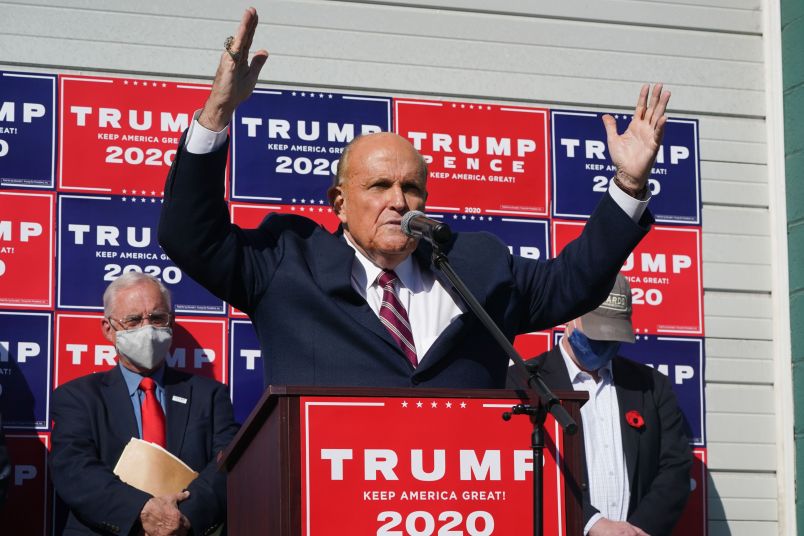Rudy Giuliani’s reported discussion of a pardon from President Trump could force the White House to reveal some more details about what exactly the President’s lawyer has been up to.
The problem is simple: how do you issue a pardon without giving away the act for which you’re providing clemency?
Legal experts told TPM that while Trump is safely within his powers to issue pre-emptive pardons, he could face some issues regarding how specific he wants those pardons to be.
“The more general it gets, the more open to challenge it is,” Michigan State law professor Brian Kalt told TPM. “He’ll have to balance the atmospherics, the politics of it, with the legal effects.”
Visually, it’s quite a mess.
Giuliani, who denies that a conversation about a pardon took place, has been working as Trump’s attorney since 2018, during the Mueller investigation. Since then, he’s gotten his client impeached over an effort to pressure the Ukrainian government into manufacturing dirt on Joe Biden.
His colloquy-for-clemency also comes as various people aligned with Trump push for the President to issue a sweeping range of pardons.
Sean Hannity, a Trump ally and perpetually enraged supporter, said on his radio show Monday night that Trump should immediately “pardon his whole family and himself because they want this witch hunt to go on in perpetuity.”
According to Kalt, the historical bare minimum that a President has had to disclose when issuing a pardon has been a timeframe. Gerald Ford, for example, pardoned Richard Nixon for “for all offenses against the United States” that he committed for the duration of his presidency.
Later, Jimmy Carter issued a pre-emptive pardon for all Vietnam war draft-dodgers from 1964 to 1973.
Neither of those pardons were challenged on specificity grounds. And, for Giuliani, it’s not clear what conduct would earn him the pardon. Manhattan federal prosecutors have been probing his role in the Ukraine scandal, specifically relating to allegations around a deal in the Eastern European gas business. Separately, some of Giuliani’s representations of foreign clients have led to allegations that he’s run afoul of laws mandating that he register as a foreign agent.
Giuliani denies those allegations.
But a broad, pre-emptive pardon has never been challenged in court on the grounds that it’s too vague.
Aaron Rappaport, a law professor at UC-Hastings College of Law, argues that a specificity requirement does exist in the Constitution for presidential pardons.
“It raises the costs for pardons,” Rappaport said, adding that specificity would force a level of transparency on the reasoning for any broad presidential pardon.
Kalt, the Michigan law professor, pointed out that accepting a pardon doesn’t constitute an admission of guilt. Even if the White House were to spell out in excruciating detail that whatever Giuliani has been up to over the past few years cannot be prosecuted, Giuliani’s acceptance of the pardon wouldn’t itself mean that he was confessing to having taken the actions that the pardon outlined.
“It doesn’t look good if you pardon someone, because you’re suggesting that there was something to pardon them for,” Kalt added. “But it doesn’t have any sort of legal effect, it’s not officially declaring your guilt.
But it could set the stage for potential future pardons of other Trump associates, or perhaps of the President himself.
“Trump is going to be getting a pardon, whether it’s a self pardon or by someone else,” Rappaport predicted. “This is a trial balloon.”







The Trump Clown Car spilleth over…
The answer, too, is simple: Pardon all acts committed within a specific period, just as Ford pardoned Nixon for everything he did while president.
Correct, never mind what bits of guilt-relieving confusion Ford carried around in his pocket.
@daveyjones64 @thunderclapnewman
Why would Trump care about the politics of anything? After 4 years are people still putting eggs in the appearances basket? The dude, a serial adulterer that thinks his daughter is hot, became the evangelical pope! If anything he’s shown that politics and appearances don’t matter at all if you keep your supporters happy. There’s a lesson to learn there - but only one party appears to be learning about that.
I think that even these supremes will have a problem with universalizing the pardon power during a democratic administration.
I’m curious about how quickly DOJ guidelines, essentially treated like scripture regarding presidential indictments, will suddenly become just minor suggestions regarding pardons.